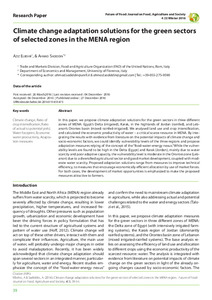| dc.date.accessioned | 2017-01-03T16:51:27Z | |
| dc.date.available | 2017-01-03T16:51:27Z | |
| dc.date.issued | 2016-12-27 | |
| dc.identifier.issn | 2197-411X | |
| dc.identifier.uri | urn:nbn:de:hebis:34-2016111451473 | |
| dc.identifier.uri | http://hdl.handle.net/123456789/2016111451473 | |
| dc.language.iso | eng | |
| dc.publisher | Department of Organic Food Quality and Food Culture at the University of Kassel, Germany and Federation of German Scientists (VDW) | eng |
| dc.rights | Urheberrechtlich geschützt | |
| dc.rights.uri | https://rightsstatements.org/page/InC/1.0/ | |
| dc.subject | Climate Change | eng |
| dc.subject | Ratio of crop intensification | eng |
| dc.subject | Ratio of actual to potential yield | eng |
| dc.subject | Water footprint | eng |
| dc.subject | Economic water productivity | eng |
| dc.subject | Adaptation measures | eng |
| dc.subject.ddc | 630 | |
| dc.title | Climate change adaptation solutions for the green sectors of selected zones in the MENA region | eng |
| dc.type | Aufsatz | |
| dcterms.abstract | In this paper, we propose climate adaptation solutions for the green sectors in three different zones of MENA: Egypt’s Delta (irrigated), Karak, in the highlands of Jordan (rainfed), and Lebanon’s Orontes basin (mixed: rainfed-irrigated). We analysed land use and crop intensification, and calculated the economic productivity of water – a critical scarce resource in MENA. By integrating the results with evidence from literature on the potential impacts of climate change and socio-economic factors, we could identify vulnerability levels of the three regions and propose adaptation measures relying of the concept of the “food-water-energy nexus.” While the vulnerability levels are found to be high in the Delta (Egypt) and Karak (Jordan), mainly due to water scarcity and poor adaptive capacity, the vulnerability level is moderate in the Orontes zone (Lebanon) due to a diversified agricultural sector and good market development, coupled with moderate water scarcity. Proposed adaptation solutions range from measures to improve technical efficiency, to measures that encourage economically efficient allocation by use of market forces. For both cases, the development of market opportunities is emphasized to make the proposed measures attractive to farmers. | eng |
| dcterms.accessRights | open access | |
| dcterms.bibliographicCitation | In: Future of Food: Journal on Food, Agriculture and Society. Witzenhausen : University of Kassel, Department of Organic Food Quality and Food Culture. - Vol. 4, No. 3 (2016), S. 39 - 54 | |
| dcterms.creator | Elbehri, Aziz | |
| dcterms.creator | Sadiddin, Ahmad | |

